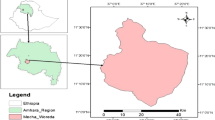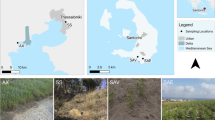Abstract
CONTRARY to the findings of Norris1, it has been possible to show regularly, in detailed growth investigations, a favourable response to calcium by strains of R. trifolii and R. meliloti. This has expressed itself as faster and more sustained growth in the exponential phase and in a greater stationary population. Calcium is also needed for the normal rod-shaped cell, compared with the markedly swollen and vacuolated condition which is a characteristic result of calcium deficiency2.
This is a preview of subscription content, access via your institution
Access options
Subscribe to this journal
Receive 51 print issues and online access
$199.00 per year
only $3.90 per issue
Buy this article
- Purchase on Springer Link
- Instant access to full article PDF
Prices may be subject to local taxes which are calculated during checkout
Similar content being viewed by others
References
Norris, D. O., Nature, 180, 1493 (1958); Austral. J. Agric. Res., 10, 651 (1959).
Vincent, J. M., and Colburn, J. R., Austral. J. Sci., 23, 269 (1961).
Marshall, K. C., Nature, 177, 92 (1956).
Author information
Authors and Affiliations
Rights and permissions
About this article
Cite this article
VINCENT, J., JANCEY, C. A Calcium-sensitive Strain of Rhizobium trifolii. Nature 195, 99–100 (1962). https://doi.org/10.1038/195099b0
Issue Date:
DOI: https://doi.org/10.1038/195099b0
Comments
By submitting a comment you agree to abide by our Terms and Community Guidelines. If you find something abusive or that does not comply with our terms or guidelines please flag it as inappropriate.



